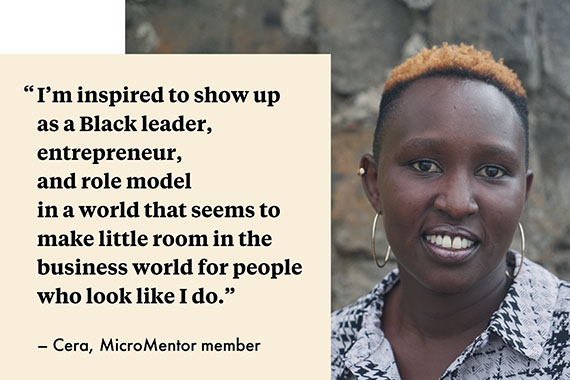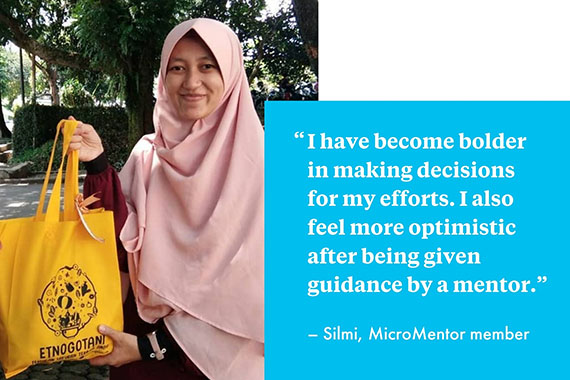
Where will you be a year from now? These days, that can be a hard question to answer. And as COVID‑19 unravels our future plans, it also reveals existing disparities. Women worldwide are losing their livelihoods faster than men, and women with small businesses are acutely affected. But data shows that creating support networks and receiving mentorship improves their chances of success. Cera and Silmi are among thousands of women entrepreneurs who have benefited from Mercy Corps’ MicroMentor platform — connecting entrepreneurs to business mentors, including a new COVID‑19 Mentor Task Force. 
Cera grew up in Kenya. She tells her story:
After graduating from UCLA, Cera returned to Kenya. She first heard about MicroMentor at a business women’s support group in Nairobi. One of the women shared that her first chicken business had survived specifically because of a mentor from India — a man whom she had never met. She forwarded Cera the link to MicroMentor. After searching on the MicroMentor platform, Cera eventually connected with Eric, a mentor based in the US. He is helping her develop her business, Ecodunia, a line of leather wallets lined with reusable grocery bags and colorful African prints, which gives back a portion of profits to fund girls’ education. Cera says:
Silmi, an agricultural entrepreneur from Indonesia, co-founded a digital platform called Etnogotani, which helps local farmers increase food production profitability. Facing challenges in building her platform and reaching her target market, Silmi joined MicroMentor, where she was connected with Satria, a mentor in Jakarta. 
In addition to increasing her confidence and skills, mentorship helped Silmi learn about financial management, and she has hired three employees. There is no one simple solution to closing the opportunity gap for women entrepreneurs. But finding a circle of support is an important start. Learn more about how and why COVID‑19 disproportionately affects women’s livelihoods — and how Mercy Corps is working to close the gaps in business and beyond. Thank you for being part of our global community of supporters. The world needs more people like you who are curious about people beyond our borders. We hope you can take a moment today to say thanks to someone special who you know is rooting for you — and give a word of encouragement to let someone else know you’ve got their back. Sincerely,
Mercy Corps Senior Director, Gender Equality & Social Inclusion Karen’s passion is to equip young people to become future leaders. She collaborates with global teams to tackle harmful norms that perpetuate inequality, and to gather evidence around what works to build resilience for individuals and communities. P.S. If you have business expertise to share, or are an entrepreneur seeking support, volunteer or ask for help on MicroMentor! |
| STAY CONNECTED |
|---|
|
||||||